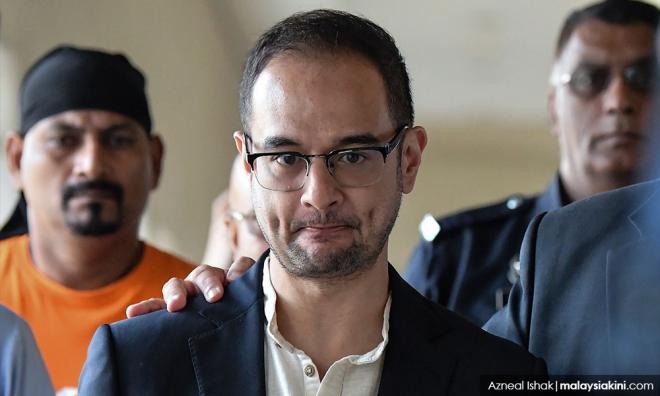
A senior lawyer has applied to review a Kuala Lumpur Sessions Court’s decision to grant a discharge without amounting to an acquittal (DNAA) of Najib Abdul Razak’s stepson, Riza Shahriz Abdul Aziz, over a 1MDB-linked US$248 million money laundering case.
Shaharudin Ali filed the application today at the High Court (Criminal Division), Kuala Lumpur Courts Complex in Jalan Duta. The application was made via email.
According to the letter sighted by Malaysiakini this afternoon, Shaharudin said the Sessions Court had erred in law when granting Riza's (photo) DNAA.
On May 14, it was reported that the Kuala Lumpur Sessions Court granted DNAA to Hollywood producer Riza in relation to the 1MDB-linked US$248 million money laundering case.
Former attorney-general Tommy Thomas had since then issued several denials over greenlighting the DNAA deal between the prosecution and Riza.
However, current Attorney-General Idrus Harun said Thomas had agreed in principle to the DNAA deal and that he (Idrus) merely proceeded with the deal due to that.
Shaharudin said the lower court had erred when it exercised its “discretion” in granting “leave” when it was unclear on what basis the discretion was exercised and whether "leave" was granted after judicial scrutiny of the material facts before the court.
He said this is because there was no such judicial discretion process in the matter for the Sessions Court to grant “leave” to the “application for leave” by DPP Gopal Sri Ram per Section 254 (2) of the Criminal Procedure Code.
Section 254 deals with the procedure when the prosecution no longer wishes to continue with the prosecution of an accused person and when such process may result in a DNAA.
Section 254 (2) states that "at any stage of any trial before a Sessions Court or a Magistrate's Court before the delivery of the judgment, the officer conducting the prosecution may, if he thinks fit, inform the court that he does not propose further to prosecute the accused upon the charge, and thereupon all proceedings on the charge against the accused may be stayed by leave of the court and, if so stayed, the accused shall be discharged of and from the same".
Section 254 (3) states that such discharge shall not amount to an acquittal unless the court so directs.
The lawyer then listed down three relevant factors not considered by the Sessions Court judge when exercising the discretion to grant DNAA to Riza.
Firstly, he said the accused was facing five serious money laundering charges involving US$248 million from sovereign wealth fund 1MDB.
Secondly, he said the case and other cases involving 1MDB is the biggest and most complicated money laundering case in Malaysia’s history.
Thirdly, he claimed that it is not fit and proper if it is said that the accused would return part of the money involving “several million ringgit”.
“The amount meant is the return of US$108 million by the accused, but that amount has already been returned by the United States Department of Justice (DOJ) to the Malaysian government, and not from the accused’s pocket.
“Since several months ago, the DOJ had stated that it is making efforts to return the money to Malaysia,” Shaharudin said in the email.
“Whether the resolution achieved by the accused (Riza) for himself to pay US$108 million is a question that was not judicially considered by the Sessions Court judge,” Shaharudin added.
“With all due respect, the judge should have postponed the case and set a new date for mention, to enable the court to receive a better and clearer explanation from Gopal Sri Ram or the attorney-general.
“This is because under Section 254(2), the judge has the right to reject the application by Gopal Sri Ram because the words 'may be stayed' shows the judge's power of discretion to not allow it,” Shaharudin said.
In the final paragraphs of the email, Shaharudin then sought for the High Court judge to call up the case records from the Sessions Court and examine Riza’s case proceedings to satisfy the High Court judge as to the correctness, legality or propriety of the DNAA order passed by the Sessions Court.
Shaharudin’s application is made under Section 323 of the Criminal Procedure Code, whereby subsection (1) of the provision states that a judge may call for and examine the record of any proceeding before any subordinate criminal court to satisfy himself as to the correctness, legality or propriety of any finding, sentence or order recorded or passed, and as to the regularity of any proceedings of that subordinate court.
Shaharudin also said that if the High Court calls up the revision application for hearing, the lawyer seeks to be called as amicus curiae (someone who is not a party to the matter but still assist the court by offering expertise and information among others).
When contacted by Malaysiakini today, Shaharudin explained that he made the application on his own volition and not on behalf of any client.
“None (client). I am just acting as a concerned member of the public under Section 323 of the CPC.
"Any member of the public can notify the High Court if they feel something is not right with the decision of a lower court if a decision is made not in accordance with the law,” the lawyer said. - Mkini


No comments:
Post a Comment
Note: Only a member of this blog may post a comment.